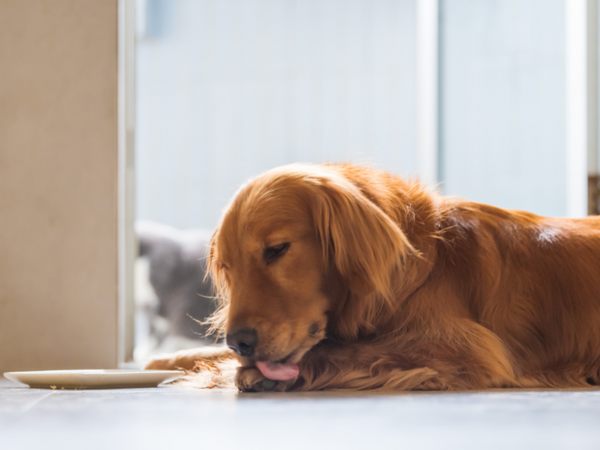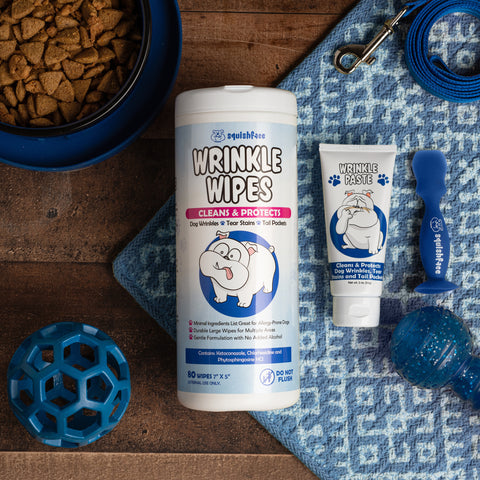Have you ever wondered why your furry friend can't seem to stop relentlessly licking everything in sight? While it might seem cute and harmless at first, excessive licking can sometimes indicate an underlying issue that requires attention. In this blog post, we'll take a look into the various reasons behind your dog's licking habit, what objects they may tend to target, and when you should be concerned. So, let's get to the bottom of this slobbery mystery and ensure the best dog care for your beloved pet!

Dog Breeds Prone to Licking:
While all dogs may engage in licking behaviors, certain breeds are more prone to it than others. Certain dog breeds are more likely to lick excessively due to their genetic predispositions and physical characteristics. Breeds with loose or wrinkly skin, like English Bulldogs, Pugs, or Shar-Peis, may be prone to skin issues that cause discomfort, as a result leading to increased licking. Breeds that are more anxious or prone to stress, such as Bichon Frises or Chihuahuas, may also lick more as a self-soothing behavior. Additionally, some dogs have higher energy levels or greater tendencies toward boredom, making them more inclined to lick objects as a way to pass the time. Understanding these breed-specific traits can help dog owners address excessive licking behaviors and provide the appropriate care for their pets.
What Causes Dogs to Lick?
- Taste and Grooming: Dogs are naturally inclined to groom themselves and their surroundings. Licking helps them keep clean and explore new scents and tastes. It's their way of experiencing the world around them.
- Itchy Skin: If your dog is constantly licking certain areas of their body, it could be a sign of skin irritation, allergies, or even fleas. They may be trying to alleviate the itching sensation.
- Hunger and Thirst: Just like humans, dogs often lick their lips when they're hungry or thirsty. If you notice excessive licking around mealtime, it might be time to fill their food or water bowl.
- Nausea: Dogs may lick objects when they're feeling nauseous. It's their way of trying to soothe their upset stomach, similar to how we might reach for a soothing drink when we're not feeling well.
- Stress and Boredom: Dogs can lick objects out of stress or boredom. Licking serves as a self-soothing mechanism and can help alleviate anxiety or restlessness.
- Dental Problems: Dental issues like gum (periodontal) disease or a toothache can lead to excessive licking. Dogs might try to lessen the pain by licking their mouths or objects to soothe their mouth pain.
Objects Dogs Tend to Lick and Why:
- Themselves: Dogs often lick their own paws, legs, and tails, either for grooming purposes or to relieve irritation.
- Furniture and Fabrics: Sofas, cushions, and blankets are popular choices for dogs to lick. They may enjoy the texture or scent.
- Food Bowls: Dogs may lick their food bowls if they're still hungry or if they enjoy the taste of residual food.
- Human Skin: If your dog licks your skin, it could be a sign of affection or simply a way to explore your scent.
- Toys and Chewables: Some dogs might excessively lick their toys, bones, or chew toys as they find comfort and entertainment in doing so.
5 Ways to Distract Your Dog from Licking:
If your dog's licking becomes excessive or concerning, there are ways to redirect their attention:
- Dog Treats: Offer your dog a tasty treat or chewable toy to provide a more appealing distraction.
- Chew Toys: Durable chew toys can keep your dog entertained and satisfy their natural urge to chew.
- Food and Water: Ensure that your dog has access to fresh food and water to address any hunger or thirst-related licking.
- Interactive Toys: Puzzle toys or treat-dispensing toys can mentally stimulate your dog and keep them engaged, distracting them from licking.
- Training: Consider training techniques to discourage excessive licking. Reward positive behaviors and redirect them when they start licking objects excessively.
Good Grooming Practices:
Good grooming is crucial for preventing dogs from excessive licking, especially for breeds prone to skin issues or breeds with wrinkles such as English Bulldogs, French Bulldogs, Pugs and Shar Peis. In addition to regular baths, using Squishface Wrinkle Wipes in between grooming sessions can help maintain clean and healthy skin for your furry friend. These wipes are specifically designed to clean skin folds, preventing the buildup of harmful microorganisms.
You can also pair Wrinkle Wipes with Squishface Wrinkle Paste for powerful results. Wrinkle Paste contains natural and limited ingredients, and can be used from head to toe to help the fight against bacteria, yeast, and fungus. By incorporating good grooming practices into your dog’s daily care routine, you can help your furry friend stay comfortable and less likely to resort to excessive licking as a means of self-soothing or addressing skin discomfort.

The Bottom Line:
In conclusion, understanding why your dog licks everything is essential for their overall well-being. While some licking is normal, it's crucial to be attentive to any changes in behavior. By providing proper dog care, a balanced diet, and engaging activities, you can help your furry friend lead a happy and healthy life without resorting to excessive licking.
Be sure to follow us on TikTok, Instagram, Facebook, Pinterest, YouTube, and visit our blog weekly for more tips on caring for your wrinkly doggo, and the latest on all things Squishface!







